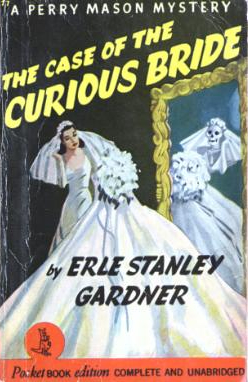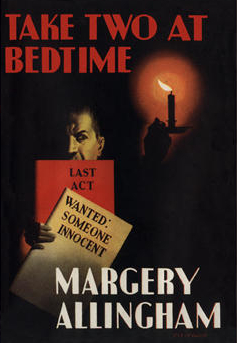The Case of the Curious Bride (1934) by Erle Stanley Gardner

 (7/10 stars)
(7/10 stars)
“What,” asked Perry Mason, “is it that you’re keeping from me?”
“Something horrible,” she told him.
Rhoda Montaine has this friend. And her friend has this problem. You see, her friend’s husband was presumed killed in a plane crash years ago. Believing herself to be a widow, the friend has remarried, only for her first husband to pop up again, very much alive. She doesn’t think her new husband would understand—he might even walk away from the marriage altogether. Rhoda wants to help her friend. Is there any way this bride can legalize her new marriage without the groom finding out?
Perry Mason has encountered many “friends” in difficult situations. While initially amused by Rhoda’s subterfuge, he grows increasingly annoyed by her refusal to admit that she is seeking aid for herself. Rhoda runs out, leaving Mason regretting his mishandling of the meeting: “She came to me for help, because she needed help. When I refused her that help, I betrayed my calling. I wasn’t playing the game.” There is only one way he can make amends. Mason must find Rhoda before someone else decides to solve her problem…permanently.
 The Case of the Curious Bride is compulsively readable, with an inventive plot that gives Mason plenty of opportunities to use his brains and get his hands dirty. The opening is a little belabored, as Mason, Paul Drake, and Della Street spend a lot of time confirming information that is already obvious from Rhoda’s original account. Once those early formalities are completed, however, the story picks up steam quickly and doesn’t let up until the end.
The Case of the Curious Bride is compulsively readable, with an inventive plot that gives Mason plenty of opportunities to use his brains and get his hands dirty. The opening is a little belabored, as Mason, Paul Drake, and Della Street spend a lot of time confirming information that is already obvious from Rhoda’s original account. Once those early formalities are completed, however, the story picks up steam quickly and doesn’t let up until the end.
Among the colorful characters involved in the case are Rhoda’s husband Carl and his wealthy father C. Phillip Montaine. The relationship between Rhoda and Carl dates back to when he was a hospital patient and she was his nurse. That dynamic still holds. “He’s weak, I love him, and perhaps one reason is because he’s weak.” Rhoda thinks she can “make a man” of Carl, but his snobbish father’s influence is proving difficult to shake. The elder Montaine wants Rhoda out of his son’s life by any means necessary and has infinite resources to make it happen. It’s a lot of fun to see Mason pitted against such a challenging rival, especially since the other figures in this case are not the brightest bunch.
When the awful Gregory Moxley meets an untimely end—for real, this time—the suspect list is short and so is the timetable. It is known that several people arrived at Moxley’s house within minutes of each other on the night of his death. The way Mason juggles doorbells, alarm clocks, and ringing telephones to nail down the timeline is enormously clever. There are only a few pieces of physical evidence, but Mason makes them all count, drawing impressive deductions from each.
The reader also gets some unexpected insight into Mason’s day-to-day pressures here. His impatience with Rhoda in their first meeting seems out of character, but it is clear that Rhoda is just one of a parade of evasive would-be clients Mason has to deal with every day. They come to him for advice only to hamper him by withholding information. Mason’s legal schemes require almost superhuman self-control to carry out, so it’s actually refreshing to see him slip and give in to frustration just this once.
It is also pointed out that Mason is free to run his law practice however he pleases because he doesn’t have to worry about earning repeat business. “Ordinarily, a man is arrested for murder but once in a lifetime,” so Mason can afford to be a little unorthodox, including his relationship with his secretary Della.
Between Della Street and Perry Mason was that peculiar bond which comes to exist between persons of the opposite sex who have spent years together in an exacting work where success can only be obtained by perfect coordination of effort. All personal relations are subordinated to the task of achievement, which brings about a more perfect companionship than where companionship is consciously thought.
This is quite a buildup for Della, who unfortunately doesn’t do much in this book to justify it. Not all personal relations are absent, however, much to the amusement of investigator Paul Drake who catches them holding hands in the office.
Mason may not concern himself with impressing current clients, but he is keenly aware of how he conducts himself in public. That dull man in the elevator who wants to tell Mason how he should have handled a past case may be a potential client or, even more importantly, a potential juror, so Mason plasters on a patient smile. He never knows when his own past interactions might come back to help or harm his client. Indeed, a former juror will help him carry out an outlandish, and likely illegal, ploy in this very case.
By now, I should no longer be surprised by Mason’s questionably legal stunts, yet he always seems to top himself. His actions here lead to a spectacular courtroom sequence that elicits an especially strong reaction from prosecutor John Lucas. One of the reasons this climax works so well is because Mason has been subtly laying the groundwork for it all along, using his psychological acumen to steer witnesses, jurors, and the prosecutor in exactly the direction he wants them to go. The sheer oddity of the Montaine case will require all of his wiles.
When a person is guilty, a clever attorney makes up a story for him to tell a jury. Therefore, the defendant’s story usually sounds pretty convincing. When a defendant is innocent, the facts don’t sound nearly so plausible as they do when they’re fabricated. When a person makes up a story, the first thing he tries to bear in mind is to make up a story that’s plausible. When he relates events just as they happened, the story doesn’t sound as plausible […] There are millions of facts which may fall from the wheel of chance in any possible combination. Ninety-nine times out of a hundred these facts are plausible and convincing, but once out of a hundred the actual truth challenges credulity. When a defendant is caught in that kind of a trap, it’s one of the worst cases a lawyer can get hold of.
One of the hallmarks of the Perry Mason series is its recognition that justice does not happen in the courtroom. Even when Mason “solves” the case in court, there are usually some additional twists to follow, exposing the full extent of the crime and demonstrating how accurately Mason is able to predict human behavior. The Case of the Curious Bride, while it boasts an excellent solution, reveals the truth about the murder in an offbeat way that does not do it justice. All of the details are crammed together into a long, breathless block paragraph that makes it hard to discern what has actually happened. Just a little more breathing room is needed to showcase an otherwise highly satisfying conclusion.
The Case of the Curious Bride is brisk, lively, and bursting with ideas, a particularly impressive feat considering that it is only one of three Perry Mason adventures published in 1934. Gardner doesn’t know quite what to do with Della and Paul yet, but the series is finding its feet in other ways. It’s nice to get some glimpses into Mason’s thoughts about his profession, and while he still spends more time detecting than he does in the courtroom, the trial scenes are first-rate. All in all, it’s a good time for any curious reader.
Second Opinions
Pulpy but very engaging story about a woman. One of the most readable Mason stories I have read so far.
Gardner really is in fine form in The Case of the Curious Bride. Courtroom scenes can be dull in the hands of lesser writers but they’re never a problem for Gardner – he knows how to build up to the inevitable display of legal pyrotechnics from Mason. We can see that Mason is about to pull a rabbit out of the hat but we have no more idea than the luckless Deputy D.A. as to how he’s going to do it. This is a lovely piece of plotting and a very very enjoyable tale. Highly recommended.
Availability
The Case of the Curious Bride is available in ebook and audiobook formats. The 1935 film version turns up on Turner Classic Movies fairly regularly; a detailed review can be found at Tipping My Fedora. This novel was also adapted for season 2, episode 5 of the Perry Mason TV series in 1958.

 (6/10 stars)
(6/10 stars)
 (8/10 stars)
(8/10 stars)
 (5/10 stars)
(5/10 stars)
 (9/10 stars)
(9/10 stars)



